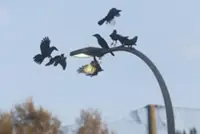GEORGE TOWN: When pigeons flutter about while feeding, people should not be near them to avoid inhaling their feather dust or coming into contact with their faeces, says a wildlife expert.
Universiti Sains Malaysia (USM) zoologist, primatologist and conservation biologist Dr Nadine Ruppert said pigeons could harbour E. coli and salmonella bacteria, some of which could pose serious health risks.





